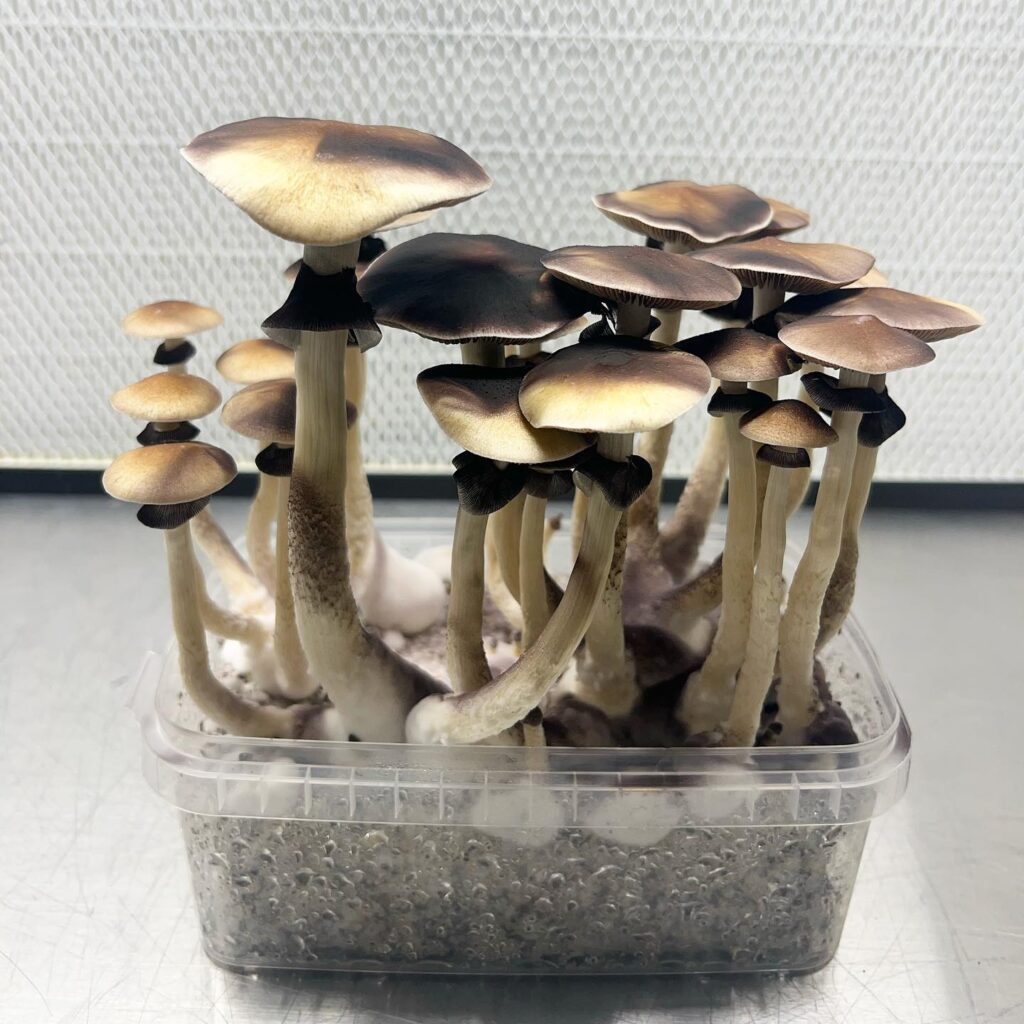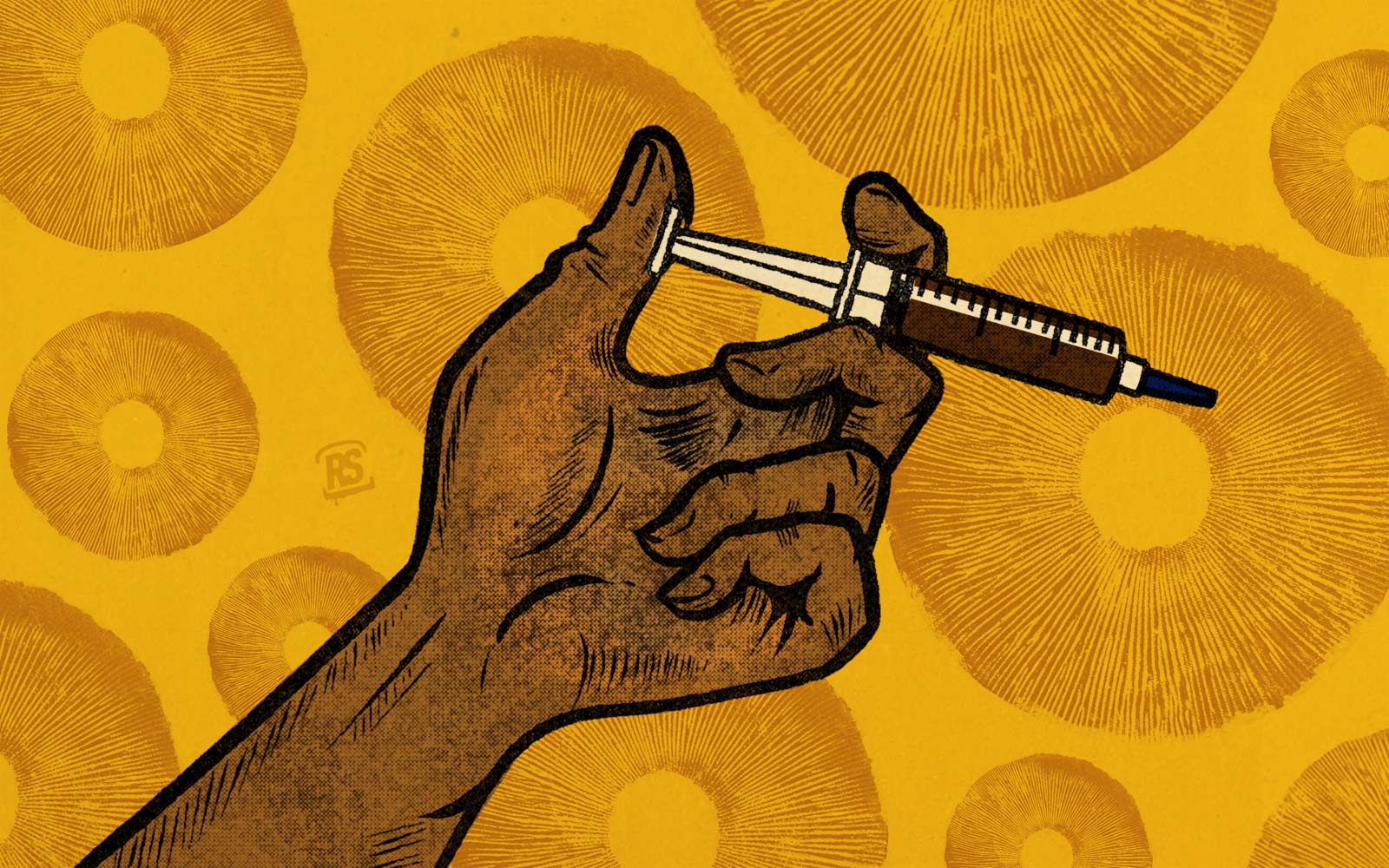Every magic mushroom cultivator, from the first-timer to the professional grower, initiates the growing process from psilocybin spores. Many countries have legal gray areas when it comes to mushroom spores. This can pose many questions and concerns to the prospective grower. Additionally, the large variety of online spore suppliers and their wide range of reputability can make the process of obtaining quality spores daunting.
This article aims to clear up any confusion on the legality of psilocybin spores. We’ll cover when they are illegal and when they are not. We will also discuss the different spore preparations used for research and substrate inoculation. Lastly, we’ll dive into how and where to find the most reliable spore suppliers.
What Are Psilocybin Spores?
Psilocybin mushroom spores are microscopic reproductive cells that are analogous to the seeds of a plant. After germinating in optimal environmental conditions, the spores begin to form thin, branching filaments known as hyphae. Over time, the hyphae will expand into a white thread-like mass known as mycelium.
The mycelium is the underground, vegetative part of the fungus that acquires nutrients from the colonized substrate. Eventually, the mycelium amasses to form fruiting bodies (mushrooms) with the right temperature, humidity, and lighting. Once the fruiting body caps mature and open, they will begin to release spores from the gills into the environment. Thus completing the mushroom lifecycle.
Are Psilocybin Spores Legal?
Unlike the mycelium and fruiting bodies, the spores do not contain the Schedule I psychedelic compounds psilocybin and psilocin. For this reason, they are not controlled in the same manner as mycelium and mushrooms in many countries and states.
In the United States, psilocybin spores are legally bought and sold in all states except California, Georgia, and Idaho. Spore vendors will generally not send spores to customers that live in these three states. In all other states, the spores are labeled and sold for research or identification purposes. When used for these purposes, hobbyists and mycological researchers study the spores under a high magnification microscope.
Do Psilocybin Spores Ever Become Illegal?
Although spores can be bought, sold, and studied legally in most states, legal issues arise when spores are used with the intention of cultivation. Although spores do not contain any psilocybin, once they germinate, the mycelium contains it. At this point in a grow, law enforcement can charge you with possession or cultivation of a controlled substance. This is also why pre-colonized mushroom grow kits (with 100% mycelium) are also illegal. One state exception is New Mexico. Here it is entirely legal to cultivate shrooms as long as the fruiting bodies aren’t dried after harvesting. Furthermore, in many cities and counties in the United States, psilocybin decriminalization efforts are currently underway. These more relaxed laws mean cultivation for personal use is a low priority for law enforcement.
Around the world, psilocybin spore possession and use for cultivation vary from strictly forbidden to fully legal. Psilocybin possession and cultivation can result in long prison sentences (or worse) in a handful of countries, including Indonesia and Malaysia. On the other hand, in Jamaica, Brazil, the British Virgin Islands, and Samoa, it is completely legal to possess and cultivate psilocybin mushrooms. Psilocybin is illegal in the Netherlands. However, a legal loophole allows for the legal use, purchase, and cultivation of psilocybin-containing magic truffles. In decriminalized countries like Portugal, Spain, Austria, Czech Republic, and Italy, psilocybin mushroom possessors and cultivators won’t face severe criminal penalties, provided it is for personal use. Like the United States, in Canada and the United Kingdom, you can legally purchase mushroom spores if used for microscopy purposes.

Buying Mushroom Spores
Spores are sold in two preparations: spore syringes and spore prints. Vendors form spore syringes from spore prints in sterile conditions. This is the most user-friendly spore delivery method for beginner growers.
Spore Syringe
A spore syringe is a mixture of sterile water and psilocybin spores contained inside of a 10mL syringe. Because the mixture does not contain nutrients, the spores remain dormant in the solution, preventing their germination.
In addition to the syringe barrel full of spores, a typical spore syringe package comes with a sterile Leur Lock needle and disinfecting alcohol pads. With all of this, it is ready to be added to a microscope slide for research or used to inoculate a substrate under sterile conditions. Spore syringes can last for over six months at room temperature and potentially years when kept in the refrigerator. Overall, spore syringes are the best beginner option, especially for introductory growing methods like the PF Tek.
Spore Prints
Spore prints are commonly used for mushroom identification purposes. However, people also use them for cultivation. They are formed under sterile conditions by placing the underside of a mature cap on a sterile medium, such as clean paper or foil.
Over a period of hours, the spores will release onto the medium, producing a unique “stamp” made up of millions of spores. Spore prints are advantageous for several reasons. They are discrete, last many years if kept cool and dry, and you can make multiple syringes out of them.
Common Spore Pricing
Spore syringes and prints of Psilocybe cubensis usually cost anywhere from $15-25, not including the cost of shipping. More prized mushroom strains and exotic varieties can run slightly higher. Oftentimes, suppliers will give per-unit discounts when syringes or prints are bought in packs.
Why Use Magic Mushroom Spores?
For the prospective cultivator, the relative legality of purchasing spores is one clear advantage over more legally troublesome options like mycelium grow kits. Even in countries where these grow kits are legally permitted, they do not offer the same versatility as growing mushrooms from spores.
Starting from spores allows you to pick from a wide range of substrates (which tend to be cheaper in bulk) and mushroom strains. It also allows you to have total control over the entire cultivation process, including the possibility of troubleshooting each phase of the growing process. And of course, as a hobby, it can be more fun learning the entirety of the mushroom growth cycle.
Where to Buy Mushroom Spores Online

If you want to grow mushrooms at home, we recommend sourcing your spores from Lab Link Supply. Their spores offer the perfect blend of suprerior genetics and rigorous lab testing, all under the guidance of leading mycologists
How to Buy Psilocybin Spores Online
With the abundance of spore vendors available online, it can be tricky to know if a supplier is legitimate or a potential scam. In this section, we will overview some tips for choosing the most reputable spore supplier.

Shop From Verified Sites
Top vendors have usually been around for a long time and have a track record of excellent customer service. They will also maintain a high-quality website, complete with a great selection of spores, an FAQ, a contact page, and an easy-to-use checkout process. Look for safe and secure payment platforms at checkout. Often, top suppliers will give discounts on cryptocurrency orders.
Shroomery maintains a list of reputable suppliers that consistently sell high-quality products and maintain excellent customer service. The Sporetraders subreddit is another excellent resource to buy, sell, or trade spores. You really can’t go wrong with a Shroomery or Reddit sponsor.
Read Reviews
Before moving forward with an order, make sure you browse the online reviews both on the vendor website as well as on other trusted websites. Legitimate companies will have a long history and a large number of top reviews.
Do Your Research
Lastly, always conduct your own independent research and use legal due diligence by heeding your state and country’s laws before moving forward with an order! The most legitimate vendors will always abide by the law and won’t indulge cultivation advice of active species.
CONTRIBUTING RS AUTHOR: DYLAN BEARD
Dylan is a freelance science writer and editor based in the beautiful Pacific Northwest. After finishing his physics degree and dabbling in neuroscience research at UC Santa Barbara in 2017, he returned to his first love—writing. As a long-term fan of the human brain, he loves exploring the latest research on psychedelics, nootropics, psychology, consciousness, meditation, and more. When he’s not writing, you can probably find him on hiking trails around Oregon and Washington or listening to podcasts. Feel free to follow him on Insta @dylancb88.















